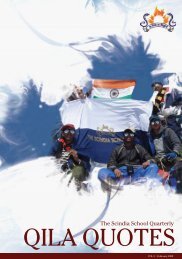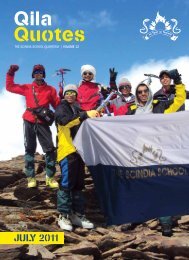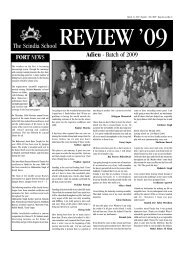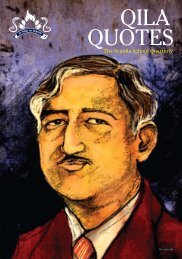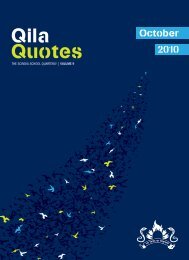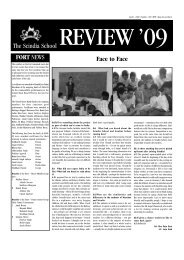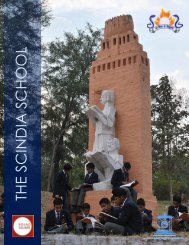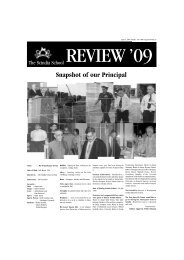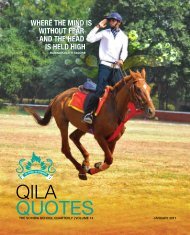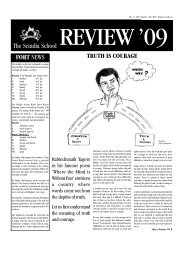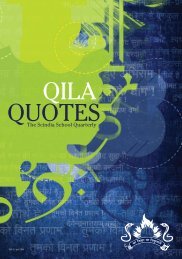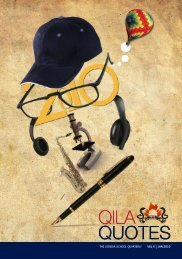24th October 2009 - The Scindia School
24th October 2009 - The Scindia School
24th October 2009 - The Scindia School
- No tags were found...
Create successful ePaper yourself
Turn your PDF publications into a flip-book with our unique Google optimized e-Paper software.
<strong>The</strong> FounderMaharaja Madhavrao Jayaji Rao <strong>Scindia</strong>Board of GovernorsPresidentH.H. Maharaja Jyotiraditya M. <strong>Scindia</strong>MembersShrimant Rajmata Madhaviraje <strong>Scindia</strong>Mr. Vinay Kumar ModiMr. Mahesh GandhiMr. Arun KanodiaMr. Harpal SinghMr. Rajendra S. PawarMrs. Sujata KulshreshthaMr. Arun KapurMr. Kapil DevMr. Bharat V. PatelMr. Anurag BansalMr. Vivek Narayan ShejwalkarSecretary/PrincipalMr. Samik GhoshVice-PrincipalMr. Jayant TengsheBursarLt. Col. Jayant Rao<strong>Scindia</strong> Old Boys' AssociationPresidentLt. Gen S.P.S. DhillionVice PresidentMr. Vikram MathurMr. Gopal BhargavaTreasurerMr. K.M. AgarwalSecretaryMr. Prashant GangwalJt. SecretaryMr Sandeep Agrawal<strong>School</strong> Contact Details<strong>The</strong> <strong>Scindia</strong> <strong>School</strong>, <strong>The</strong> Fort,Gwalior - 474008. MP, INDIA.Telephone . : +91-751-2480750Fax : +91-751-2480650E-mail : office@scindia.eduWebsite : www.scindia.eduCONTENTSFrom the Principal’s Desk 04Editorial 05Old Boys’ News 07Interview 08Interview with ace photographerAmit Ashar Ex Md ’83with Mrs. Puja PantEditor - <strong>The</strong> <strong>Scindia</strong> <strong>School</strong> Review.Alumni 10Dare to dreamDebarshi Dasgupta (Ex-Dl 1999)<strong>The</strong> American MasteNandlal Rane (Ex-Vivekanand ’67)Staff 12Offsite Programme at OrchhaMr Jayant TengsheVice Principal, <strong>The</strong> <strong>Scindia</strong> <strong>School</strong>Parents 13<strong>The</strong> Joy of WritingMr. Nanu Biju(father of Avinash Biju class XII C)Director Pavilion & InteriorsCover Page Illustration: Jivitesh MazumdarLiterary Section 15<strong>The</strong> world has changed, have we?Anirudh SoodXI AViolence in <strong>School</strong>sKritin KohliXI C<strong>The</strong> Youth Camp in GermanyAkshay Kumar GurujiXI ATimelessSome things Never Change 20<strong>The</strong> Blue Extravaganza - 1986Samir Kumar(Extract from the <strong>School</strong> Review,NO. 614, December 12, 1986 )<strong>The</strong> Blue Extravaganza - <strong>2009</strong>Arjun SaraswatXII CMessage Board 21ReminiscencesEvery effort has been made to ensure the accuracy of the information printed inthis edition of Qila Quotes. If an error has occured, please accept our apologies andcontact the editor at pujap@scindia.edu.
Qila Quotes | From the Principal's DeskVOL 5 | Oct <strong>2009</strong>FROM THEPrincipal’s DeskDear Members of <strong>The</strong> <strong>Scindia</strong> <strong>School</strong> family,<strong>The</strong> editor sets firm deadlines for me as she does for her students for their home work.Though late, the Fort was blessed by the monsoon. Everywhere we look now it is green and we have hadsome fairy tale skies during the Astachal. <strong>The</strong> present edition of this communiqué will bring you glimpsesof the celebrations of Janmashtami, Independence Day and Ganesh Chaturthi. <strong>The</strong> freshers’ evening wasa wonderful exhibition of talents.On the sports field, we have had exciting moments of competition and some sparks of brilliance duringthe inter house tournaments in Soccer, Tennis, Basketball, Swimming and Athletics. <strong>The</strong> obstacle courseson the Junior <strong>School</strong> field and Madhav field seldom go unused. <strong>The</strong> new Squash courts are the latestattractions.<strong>The</strong> students and the staff joined hands on important issues of values and ethics in the spirit of committingourselves to certain common goals. Skill based grading in every subject along with an appropriateassessment mechanism has been introduced for Classes VI, VII and VIII. Special efforts are on with properfocus to enhance the performance of the students in academics, which includes the advanced as well asthe under achieving students.I am delighted to share with you that the school was adjudged the winner of the Digitally Learning ICTEnabled <strong>School</strong> of the year <strong>2009</strong> by e-India.<strong>The</strong> Career Counseling cell organised a series of visits by representatives of various foreign universities.<strong>The</strong>y are constantly at work with the students and providing them with necessary guidance.Lot has been done to take our teaching of English and communication in English to a new plane. Iconsciously would like to mention our Inter House debates, quizzes, elocutions, art and music competitionshere as I feel these are essential components of the educational curriculum of the school.Some of our participations were cancelled or postponed as a precautionary measure against the spread ofthe H1N1 virus. <strong>The</strong> movement in and out of school was curbed. I appreciate the cooperation and supportwe received from all corners.One cannot miss two young Australian GAP volunteers moving all over the campus on their bicycles.<strong>The</strong>ircontribution in the English classes and in the Junior <strong>School</strong> dormitories has been extremely encouraging.<strong>The</strong> school has successfully made them a part of its family. I give credit to the boys and the staff whodisplay such exceptional hospitality.It is a matter of great pride and celebration that SOBA completes its Golden Jubilee. <strong>The</strong> members haveshown great fellowship and a genuine goodwill for the school. I am sure it will continue and strengthenevery passing year. We have had a number of Old Boys visiting the school from time to time. It is alwaysa pleasure for us and we appreciate the warmth and affection they bring.At the time of writing this note, we are eagerly awaiting the Platinum Jubilee Debate and Quiz and ourFounder’s Day celebrations.Best wishes.Samik GhoshPrincipal, <strong>The</strong> <strong>Scindia</strong> <strong>School</strong>
<strong>The</strong> quarter began with thereopening of the <strong>School</strong> on the 8thof July. <strong>The</strong> students came backrejuvenated after a long summerbreak. <strong>The</strong> campus which lookeddesolate in their absence startedbustling with life on their return.<strong>The</strong> school also accorded a warmwelcome to the new students.Though homesick at first theysettled down soon and gave aglimpse of their talent through anenjoyable ‘Freshers’ Evening’.We boast of an enviable IT facilityand it’s a matter of great pridethat <strong>The</strong> <strong>Scindia</strong> <strong>School</strong> has beendeclared the winner of eINDIA <strong>2009</strong>Awards in the category 'DigitalLearning ICT Enabled <strong>School</strong> of theYear'.Continuing with the constantupgradation of infrastructure, thesquash court has been renovatedto meet international standards. Ithas been provided with importedmaplewood flooring. A new lawnhas been laid around 40m radius ofthe existing Madhav Pavilion CricketPitch as phase I of Sports FacilityDevelopment Programme.Appointments have been made to allthe societies of the <strong>School</strong>. <strong>The</strong> newposition holders are shouldering theresponsibility with great dedication.EditorialCelebrations<strong>The</strong> quarter was marked by various celebrationsand the students enjoyed the festivities with greatenthusiasm. Janmashtmi and Ganesh Chaturthiwere celebrated with great religious fervour. <strong>The</strong>entire school gathered for bhajans and aarti.Prasad was distributed to all.Independence Day was celebrated on Saturday 15thAugust. It was an impressive ceremony completewith march past, band display and devotionalsongs and speeches at astachal.InitiativesOn Monday 31st August the staff and the studentstook an oath of nonviolence. <strong>The</strong> entire schoolcommunity pledged to stand up against violenceof all kinds. This will go a long way in fostering anatmosphere of harmony in school.Encouraged by the success of the Cambridgeformat of debating, which was introduced in theMiddle <strong>School</strong> level last year, the same has beenintroduced at the Senior <strong>School</strong> level this year.Academics<strong>The</strong> term began with two ambitious academicinitiatives each with its definite objectives. <strong>The</strong>seare, ‘a grade based system of testing and assessmentfor classes VI to VIII’ and ‘a rigorous programme ofacademic effort and guidance for class XI Sciencestudents’<strong>The</strong> programme for senior students involves dailyclasses for an hour in the evening for additionalteaching, exposure to advance concepts andclarifying doubts. <strong>The</strong> idea is to complete thesyllabi (both theory and practical) well in time sothat adequate revision of the CBSE course can becarried out. Other purposes are to prepare studentsfor some of the competitive exams and satisfy theirappetite for the subject to a maximum extent.<strong>The</strong> school has acquired some Teacher ResourceMaterial for this purpose from a competent source.It is probably needless to mention that teachersinvolved are working hard and giving their best tothe students.<strong>The</strong> objectives behind the initiative for youngerstudents are also manifold. We desire to ‘free’them of their dependence on marks and all thecompetition it entails. At the same time we wish toknow their areas of strength and weakness moreaccurately and comprehensively. Accordingly,a set of skills (and a few aptitudes) has beencarefully identified for every subject and students’progress in these will be monitored continually.Qila Quotes | Editorial | 5All departments have begun evolving a rubricto clearly detail competence level in a skill thatcorresponds to a particular grade in their subject.Of course, students will be given ample supportand guidance in the process. <strong>The</strong> report formatshave been completely altered keeping in mind theabove parameters.We hope that both these programmes will lead toa much more vibrant academic environment oncampus meeting students’ needs at various levels.In near future we hope to extend the learning fromthese to other groups of studentsVisitsAs part of the efforts undertaken by <strong>The</strong> GermanSociety four boys were granted 100% scholarshipunder the PASCH project (Schulen Partner derZukunft) Two of them attended a course inGermany and the other two went to Yercaud inTamil Nadu.Seven students went on an exchange to differentschools in UK. <strong>The</strong>y attended classes there andwere exposed to the teaching strategies followedthere. <strong>The</strong>y also got a glimpse of the culture andtradition of the host country. All the students cameback enriched and shared their experiences withthe school.VisitorsJoseph O’Neil and Joshua Bowden have comefrom Newcastle, Australia through an organizationcalled Lattitude. <strong>The</strong>y will be in <strong>School</strong> till theend of December. <strong>The</strong>y are teaching English tothe junior classes and participating in the schoolactivities wherever they can. <strong>The</strong> students areenjoying their lessons and we hope they have arewarding stay here.<strong>The</strong> Career Cell organized a visit by a representativefrom <strong>The</strong> British Council and <strong>The</strong> CanadianEducation Center, New Delhi. All the doubts andqueries of the students regarding the variouseducation and career options were clarified.CompetitionsA large number of competitions in school keptthe school life vibrant and gave the students anopportunity to display their diverse talents. <strong>The</strong>highlights of the quarter were the Inter HouseAquatic Meet and the Athletic meet.<strong>The</strong> <strong>School</strong> hosted the HH Maharaja MadhavraoMemorial Hindi Debate which elicited enthusiasticparticipation from various schools. <strong>The</strong> debate waswon by <strong>The</strong> <strong>Scindia</strong> <strong>School</strong>.Qila Quotes | Student Achievements | 6 VOL 5 | Oct <strong>2009</strong>StudentAchievements<strong>The</strong> C.B.S.E. awards certificates of merit in each subject to the top 0.1% of thesuccessful candidates in order to recognize their merit and outstanding performanceat its Secondary <strong>School</strong> and Senior <strong>School</strong> Certificate examination. Samridh Agrawal(Social Studies) and Vineet Mittal (Maths) of class X and Samarth Singh Ashiya(Political Science) of class XII were awarded the same for their excellent grades in theBoard Examinations.Palaash Bhargava, whose name was shortlisted from the merit list of CBSE, class XBoard, has been sent an invitation by CSIR, a government body, to visit their regionallabs and work with a scientist for two days in December.<strong>The</strong> <strong>Scindia</strong> <strong>School</strong> hosted the Limca Book of Records Quiz <strong>2009</strong>. A total of 60teams from all over the city participated in it. Three teams from our school took part inthe quiz. <strong>The</strong> team comprising of Neeraj Dhodi and Sankalp Rathour reached thefinals and were adjudged the runners up. <strong>The</strong>y have been awarded certificates andmedals for the same.A team of boys participated in a Literary and Art competition held at Vidya DeviJindal <strong>School</strong>, Hissar. Jivitesh Mazumdar secured the second rank in the artcompetition and Anirudh Sood stood second in the Declamation competition.A team comprising Tarang Tripathi, Ujjaval Agarwal and Anirudh Todi participatedin the Miss Saroj Srivastava English debate held at Welhams. Tarang Tripathi wasadjudged the best speaker in the first round and also the overall best speaker. <strong>The</strong>school team stood second.Harshit Krishna of class XI has made us proud by participating in the Junior SwimmingNational Camp which was held in Jaipur.Samridh Agrawal was adjudged the best speaker in the first round of the HH MaharajaMadhavrao Memorial Hindi Debate hosted by <strong>The</strong> <strong>Scindia</strong> <strong>School</strong>.In the final round of the same debate Samridh Agrawal and Aakash Surana wereadjudged the second and third best speakers respectively.
Qila Quotes | Old Boys' News | 7Qila Quotes | Interview | 8 VOL 5 | Oct <strong>2009</strong>Old Boys’ NewsNalin Mehta’s(Rn ’96) book 'India on Television: How Satellite News Channels Changed the Way WeThink and Act' (New Delhi: Harper Collins, 2008) has been awarded the Asian Multimedia PublishingAward for Best Book/Best Writer on Asian Media. <strong>The</strong> announcement was made at the Asian PublishingConvention in Manila.Kalyan Banerjee (Ex Md’59) and Madhav awardee for the year 2003), has been selected by theRotary International Nominating Committee to be the Rotary International President for Rotary Year2011-2012. He thus becomes the third Indian to be the President of Rotary International in its history of105 years. Contact banerjeekm@uniphos.comLt Gen BS Sisodia (60’s), on retirement from the Army after a distinguished career, has been selectedand appointed as a Member of the newly set up Armed Forces Tribunal (AFT). <strong>The</strong> AFT has been set upby the Government of India to provide speedy redressal of the grievances of Officers and personnel belowOfficer rank. Gen Sisodia has been posted to the Lucknow Bench of the AFT which has jurisdiction of UP,Uttrakhand, MP and Chattisgarh.Insaaf, Alliance of Artists, Activists and Academicians and Control Arms Foundation of India hosted thefourth edition of ‘Cinemala Festival’ in New Delhi. <strong>The</strong> festival offers a platform to budding film makersto showcase their creativity and to interact with veteran film personalities in an informal manner. RahatKulshreshtha’s (Ex Ja ’07) 30 minute film, ‘Shackles of Liberty’ was also screened there. Describedas a human rights film it focuses on the controversial detention facility set up by the US in GuantanamoBay. It is a matter of great pride that the film has also been shortlisted for the Golden Gate Fiction &Documentary Festival, San Francisco (USA).Jaspreet Singh Walia (Ex Mj, left the school in ’92) would like to share with the fellow <strong>Scindia</strong>nsthe news of the completion of his film, ‘Lamha’ which is slated for release in December/January. <strong>The</strong> film,which is a thriller, is set in Kashmir. It has an impressive star cast and a great storyline. We are sure thatthe movie will be a resounding Success. Contact jaspreet.walia@avmite.com.Dr Sudhir Bloeria( Ex Mj ’62, Madhav Awardee for the year 2004) visited the school andstayed on campus for a week. He attended the school functions and interacted with staff and students. Headdressed the students and gave them informative talks on different topics. <strong>The</strong> teachers also enjoyed aninformative discourse on J&K. All of us enjoyed interacting with him and have greatly benefited by hispresence.Divyanshu Poddar (Mj’08) has secured a B.Tech seat for aerospace engineering at IIST, Trivandrumon 100% scholarship.Rohan Borpujari (Ex Sh ’08) has got admission in Manchester University, Manchester for completionof his B.A and M.B.A in four years. We wish him all the luck.<strong>The</strong> Bhopal chapter of SOBA organised a get together at Greenwood Country Club, Bhopal. This wasattended by 70 old boys. <strong>The</strong> highlight of the evening was the felicitation of former teacher Mr ShareefAhmad.<strong>The</strong> members of Nagpur SOBA donated Rs. 14000 to Asha <strong>School</strong> run by Army Wives Welfare Fund.<strong>The</strong> DD for this amount has been sent to Lt. Gen. SPS Dhillon, National SOBA President. Nagpur SOBAhas also been very active on the social front. <strong>The</strong>y had an informal coffee evening and also organisedan indoor sports meet which was attended by a large number of <strong>Scindia</strong>ns along with their families. Allparticipants were distributed beautifully designed SOBA badges and a SOBA table-top memento on theoccasion. <strong>The</strong> meet commenced with a <strong>Scindia</strong>-style nihari and tea and ended with a sumptuous lunch.Ed: What is that one thingwhich you would like <strong>The</strong><strong>Scindia</strong> <strong>School</strong> to have?AA: To never part with/orchange the unique heritagesetting that we have...ourbeautiful Fort. I would alsolike to see a good and wellequipped photographicsociety/ department. If there’sany help I can be of, in thearea of sharing my experiencesin photography.........anytime!Would love to share myknowledge with the boys.Interview oface photographer AmitAshar Ex Md ’83with Mrs. Puja Pant, Editor- <strong>The</strong> <strong>Scindia</strong> <strong>School</strong> Review.Ed: How did you decide to take up photography as a career option? Were you involvedwith it while in school?AA: I happened to meet a photographer, who was in shorts and a t-shirt, in his air-conditioned studio (therewas great music playing too) with a mug of coffee in his hand, and he was lighting up a lovely model fora fashion campaign!! That was it!!....I thought to myself...'this man’s not working!! He’s enjoying himself.This looks like something I can do for the rest of my life!!' And that was the beginning! <strong>The</strong>n I worked asan apprentice with a photographer called Sanjeev Angne (India’s leading car photographer today). Thatwas my learning phase and I loved every bit of it!!Ed: You take up different kinds of photography assignments like shooting portfolios, film advertising,commercials etc. What do you enjoy the most and why?AA: Yes I take up many different types of assignments and actually enjoy all but what I enjoy the most isbeing on my own and just wandering. Being in a new place helps because everything is new and fresh.Your curiosity is heightened. <strong>The</strong> images I shoot then, are entirely me! <strong>The</strong>y are not shot for anyone orto sell any product or to impress anyone. Purely my space, my way of seeing and expression. It’s verysatisfying to see a good image that way.Ed: What are some of the positives and negatives of your job?AA: Everything is positive!!! <strong>The</strong> only negative was the one you made prints from!! I can’t think of beingin any other profession!Ed: Is there any one assignment that you are particularly proud of?AA: I am very proud of an ad campaign I shot for the telecom giant TIGO for Ghana and my campaignfor RANG DE BASANTI.Ed: You had visited the <strong>School</strong> for the 25th year reunion of your batch. How was it to come back to the<strong>School</strong> and meeting your batchmates after so many years?A.A.- It was amazing to meet the boys and their families! <strong>The</strong> 25 years gone by just disappeared!! It waslike yesterday!!Ed: Will you ever plan to come and do a photo shoot in school? Which place in the school do you thinkis the most photo friendly?AA: Oh sure!!! If the demands of the shoot are a location like our fort then surely yes I will come andshoot there. <strong>The</strong>re are so many beautiful spots there...the Mansingh palace has some very interesting andmysterious nooks and crannies. My favourite spot not photographically though, but just to experience, isthe Astachal. Love it!!Ed: Mrs. Puja PantAA: Amit Ashar
Qila Quotes | Alumni | 10 VOL 5 | Oct <strong>2009</strong>Dare to DreamFor a moment I felt as if I belonged to an endangered species destined for apublic exhibit. “Why don’t you write about yourself?” Former Principal Mr N.K.Tewari asked me on my recent visit to <strong>Scindia</strong>. “I don’t want any reminiscencesabout school. Just a piece about who you are and what you do. Show there’s aworld beyond IITs and IIMs.”How could I, I wondered. Am I at all a model of ‘success’ to be feted as anexample? In my bid to answer these nagging questions, I found myself staringat a blank computer screen – my head flanked by both my palms – andlooking for a clinching argument to convince students to stay away from theoverpowering lure of IITs/IIMs and IT. Is there any? Especially one that hasto be made by a journalist who earns far less compared to the technologyprofessionals in his peer group? <strong>The</strong>re is none really, I concluded, if one wantsto study computers or get into an IIT/IIM. And that is my only argument: Dowhat you want, not what others expect of you. For that is what I did and thatis the only wisdom I have to share.It is essential you pursue what you like, not what others insist you must. Ifyour goal is to get into the IITs and IIMs, then let nobody dissuade you. But onthe other hand if you detest them, it is equally important – in fact more – youthumb your nose at naysayers. For there will be many. More often than notpeople end up on the IIT-IIM route for three main reasons: first, because mostof his peers are headed that way; second, most people he knows, includinghis parents and teachers, want him to head that way; and third, for mintingquick money. His volition doesn’t factor as a reason to be there. Given a choice,some of them would have been linguists, some mime artistes and a possiblefew even felinologists. In all likelihood they would have earned less but inall probability they would have turned out to be happier. Let me reiterate: Dowhatever keeps you happy and at your best.This implies a child in his formative stage must have access to different andpossible ‘career avenues’ to know what suits him best. It is nearly impossiblefor families who have to fight for subsistence to enable that kind of a milieubut there is no excuse for prosperous schools, their parents and teachers notto do the same. That is why students who come to <strong>Scindia</strong> must make themost of the possibilities outside classrooms. And teachers, administrators andparents must ensure there are as many as possible to choose from. <strong>The</strong>y havean important role to play in the cognitive growth of children. It takes a set ofprescient and encouraging parents and teachers to recognise what the childwill do best. If they receive no support from home and school, children arelikely to lose the urge to be what they want and forgo their individuality. I waslucky to have had parents and teachers who encouraged learning outside theclass, whether it was reading books, theatre, debating, working for the Reviewor pursuing photography.Even my love for learning new languages was nurtured at <strong>Scindia</strong>. Mr A.N. Dar,who was the Principal then, took the unusual decision to send an exchangestudent to a non-English speaking country. He picked me to represent <strong>Scindia</strong>at Schule Schloss, Salem in Germany. I couldn’t thank him enough for it eventoday. That probably made me the first <strong>Scindia</strong>n to spend a term in a countrywhere the native tongue was not English. I did learn German in my threeand-a-halfmonth tenure there but unfortunately lost it somewhere alongthe way. Nonetheless, I had learnt delightedly of worlds beyond the Englishlanguage. That pushed me to pick up French and Persian. It even strengthenedmy resolve to rediscover languages I knew: Bengali, Hindi and Assamese.Any language other than English, I strongly maintain, opens up worlds thatremain shrouded under the overpowering dominance of English.That’s how my fascination for Iran developed, something most people findhard to understand. Iran has none of the Silicon Valley’s entrepreneurial glitzthat draws in hordes of youngsters to computers. Can a career be made outof Iran? People often ask me. Frankly, it is a concern for which I thank thempolitely but for which I am not thankful at all. Iran is something that interestsand delights me like no other country. If it leaves you snoring, then so be it.While learning Persian, I realised that what most Indians read about Iran iswritten for the western (read American and British) readers. <strong>The</strong> articles glossover the many nuances of this ancient land and its people. Moreover, there islittle in these dispatches that tells us why Iran is so important for India. Neitheris there any mention of the historical legacy of Indo-Iranian ties. It is to undothis flourishing model of unipolar journalism that I hope to report from Iranfor Indian papers and journals.This is akin to the pressing need there is to tell students of ‘worlds’ beyond IT.Youngsters will know of the worlds beyond a computer if they get to samplesome while at school. And any inchoate interest can only be sustained withbacking from people who matter (parents and teachers). I returned feelingsomewhat reassured from my visit to <strong>Scindia</strong>. I had the chance to meet theonly Class XII student, Tarang Tripathi, studying humanities in a crowd ofscience and commerce students. Propped up by his parents and the school, hewas happy charting his course. In a world of threatening homogeneity, thereis enough space for ‘oddballs’ like him. And it is a solemn responsibility ofoutstanding schools like <strong>Scindia</strong> to ensure they are not entirely extinct and, infact, to attempt to increase their tribe.Debarshi Dasgupta(Ex-Dl 1999) is a correspondent with Outlook magazine in New Delhi. Hehopes to live in and report from Iran one day as part of his larger goal to travelto places where Indian journalism hasn’t.I can assert without the faintest doubt that my tenure at school crafted me theway I am today. My decision to become a journalist was conceptualised andreinforced because of my involvement with the Review. I had to study and playgames while at school. I didn’t have a choice. But, on the other hand, I wantedto edit the Review and I longed to write for it. That was my choice. And therewas joy and contentment in it like none other.
Qila Quotes | Alumni | 11Qila Quotes | Staff | 12 VOL 5 | Oct <strong>2009</strong><strong>The</strong> American Master<strong>The</strong> noise in the classroom subsided as we became aware of a tall foreignerstanding at the entrance door. With a few long strides he reached the blackboardand turned to face the class.“Hi! I’m Terry D. Plemons” he said in a somewhat high pitched nasal Americanaccent. He scribbled his name in capitals on the black-board.“You can call me Terry” he said as he turned to face the class again. “I’ll beteaching you guys Physics”.<strong>The</strong> class, by now was standing up, suddenly realizing that this boyish lookinglanky American, clad in jeans, checked shirt worn over a round-necked whitetee-shirt was the new Physics master.Earlier there had been Englishmen who had taught English at the school, butnever before an American.Terry had already broken several rules.He had used the banned words ‘hi’ and ‘guy’. <strong>The</strong>se American terms had justbegun making an appearance in India at the time, and were deeply frownedupon by the English Masters and the <strong>School</strong> Principal.His dress code was also taboo. He was now sitting on top of the masters table,instead of behind it.He asked us to introduce ourselves, making each one spell out his name, whilehe wrote it down in his diary, making valiant attempts at proper pronunciation.Terry was from Tennessee and was doing voluntary service with the AmericanPeace Corps. This was his first visit to India.It was some time before we could fully ‘figure out’ what he was saying. Butonce we began understanding him, we started speaking amongst ourselves inexaggerated Terry accents.Terry’s teaching methods were different. He expected the boys to have read thetheory from the prescribed book. He would ask objective questions testing outhow well the theory had been understood, rather than asking boys to parrotNewton’s laws. And he loved giving problems to solve and would regularlyconduct class tests.When the marks of his first test were announced, we were shocked as manyof us had received 100% marks. In those days, for a correct answer, you wouldat best get 7 or 8 out of 10, provided you had written the answer in a neathandwriting without any words or figures being crossed out. With his liberalmarking, Terry became an instant hit.Terry was keen on sports but knew nothing of cricket, football and hockey. Oneday, at the end of class, he asked us whether we would like to play baseball andAmerican football. We agreed enthusiastically. Television being non-existent inIndia at the time, we knew nothing about these American sports. .For our first game of baseball, Terry brought with him a baseball bat and ball,as well as some gloves. <strong>The</strong> leather ball was much larger than a cricket ball,and the round bat much heavier than a cricket bat. When hit, the ball wouldn’tgo very far and seldom went in the desired direction. However, the rules weresimilar to ‘rounders’ which we used to play with a cricket bat and tennis balland so we picked up the game pretty fast.American football was a totally different proposition. We collected on a Sundayafternoon on the main football field. Terry, with the help of some malis, hadalready marked several parallel lines in choona across the field. <strong>The</strong> leatherball that he held in his hands was an oval shaped oblong object.Terry formed two teams and tried explaining the rules. Though it was calledfootball, very rarely was one allowed to kick the ball. Instead, one had to runwith the ball in one’s hands and pass it only backwards to one’s teammates.Every now and then, the two teams stood in lines facing one another. <strong>The</strong>moment Terry blew his whistle, the person with the ball would pass it betweenhis own legs to a team mate behind. <strong>The</strong> rest of the team members wouldengage in wrestling bouts with their opposite numbers. Terry kept blowing hiswhistle, trying to explain the fouls and ordering the teams about. But the ruleswere too complex and it was much more fun kicking the ball and watching thezigzag path it took after hitting the ground. Terry screamed himself hoarse andfinally gave up. He refused to play American football with us again.Terry left us at the end of the year and we all missed him. He went on to TexasUniversity and did his Masters, PhD and Post Doctoral research in underwateracoustics, on which he is an authority (and no doubt advisor to the US Navyon its stealth sub-marine project).Nandlal RaneEx-Vivekanand ’67<strong>The</strong> teachers of <strong>Scindia</strong><strong>School</strong> went to Orchha,Madhya Pradesh for theoffsite programme this yearinstead of their annualsojourn to the Himalayas.This year the programmewas special as Mr. SamikGhosh, the new Principalwas joining us for the firsttime.Offsite Programmeat OrchhaAlthough a host of themes were initially considered, for paucity of time only a few could be pursued.However, it turned out to be a boon in disguise as some core issues could be looked at comprehensively.In the inaugural session the VP underlined some basic facets of Report Writing and mentioned a fewlacunae in our current practices. He provided a sampler of different report forms and formats. Each facultywas then asked to think about five most relevant subject parameters and indicate a likely format for thereport. Though initially thought daunting, most departments were eventually able to accomplish the taskfairly well. This brain storming session was found very illuminating by all and many interesting formsand formats were evolved. <strong>The</strong>se have been scanned and will also be put to use in our new academicendeavour at classes 6, 7 and 8 wherein we shift from an exam based module to other non-intrusiveand skill based modes of assessment.In another important session each faculty head was asked to present a report of the departmentalactivities, initiatives, concerns and also comment on their board examination performance overthe last few years. Some challenging questions were posed to the heads of department and stiff targetswere set. However, they were also given a clear sense of direction and purpose. A clear mandate forimproving departmental performance in terms of appreciation for the subject, enhancement of skills andperformance at the board examinations has been stated.<strong>The</strong> Principal conducted a session on Learning in Groups through Enquiry and its particular relevanceat the middle school level. As part of the ‘assignment’ every faculty was required to submit a lesson plan.Several very thoughtful lesson plans were proposed and are in fact to be pursued in the current academicsession. Everyone enjoyed and gained by this valuable session.Two shorter sessions were conducted, one on Ecology of the Fort and the other on Working Togetherthat looked at various gender and hierarchy issues at school.<strong>The</strong> VP shared his concerns about diminishing indigenous flora on campus, the plastic menace anddisposal of garbage and wastage of several resources. This self-reflecting and awareness session madeeveryone realise the looming dangers and need for urgent corrective steps. <strong>The</strong> VP has prepared adocument on ‘Ecology of Fort’ which indicates many possible courses of action. It was reassuring todiscover that a few initiatives have already begun in this direction.<strong>The</strong> session on working together looked at our gender and hierarchical attitudes and the need to exhibitmore sensitivity and sensibility in these matters. It was also recognised by the group that every member ofthe teaching community has a right to adequate job satisfaction and a sense of fulfillment and everythingpossible should be done to protect and support it by the community.<strong>The</strong> ‘heavy’ sessions were lightened by some entertaining activities. Teachers enjoyed playing differentgames and a few were even able to win prizes in the process! <strong>The</strong>re was an impromptu music recital by ourmusically talented teachers. Many had the joy of watching beautiful sunsets and sitting by the riverside inthe evenings. Everyone came back with pleasant memories, definite insights and a feeling of camaraderie.Mr Jayant TengsheVice Principal<strong>The</strong> <strong>Scindia</strong> <strong>School</strong>
Qila Quotes | Paremts | 13Qila Quotes | Parents | 14 VOL 5 | Oct <strong>2009</strong><strong>The</strong> Joy of WritingIt was nine in the night. I wasat my laptop trying to do thecosting of a tender that hadto be urgently sent beforeworking hours the next day.My mind was really not there.I was thinking about a mailI was planning to write. Itwas an old habit, planning aletter.You see, I love correspondence. I used to write letters, lots of them, in an era when the red postbox andthe postman on his cycle were integral parts of our daily lives. For me, then, writing letters was a matterof pleasure fraught with lots of effort and emotion. <strong>The</strong>re were various steps in the writing of a letter.First I would compose the letter in my mind. I couldn’t bear the thought of a letter, which had spelling orgrammar mistakes in it, reaching a friend. I was also very particular about the syntax and punctuations.After the mental exercise I would make the first draft on paper. <strong>The</strong>n I would read it carefully and makecorrections. Next I would re-read it and make further modifications. <strong>The</strong> first corrections would be inred colour, the second in green etc so that I could differentiate and choose between the two in the finalreading. My prized possession those days was a ball point pen, that had four coloured refills in it, giftedto me by Chechy [elder sister]. Before making the fair copy I would make a final draft. And then I wouldbe ready to write the letter. I was very careful to make an overwriting or two in the letter so that it wouldseem like an extempore effort!I started writing letters even before I had a friend to write to! I studied in the village school till class tenand all my friends were from the same village. But Chechy was studying in college, staying in a hostel.When she was home during vacations she would talk about her friends. So I knew Kusum, Uma and Valsalike my own friends.I do not remember when or how the idea germinated; I decided to write a letter to Kusum Chechy.Here I was, going to write my first real letter and to say that I was excited would have been anunderstatement. I thought at length about the opening line.“Hello Chechy, How are you”? Too mundane!“I wanted to write to you for a long time”. Why would I want that?I tried to be a bit more imaginative and tried, “How do you like to get a letter from the brother of your bestfriend”? That sounded silly.I must have tried a hundred variants but could not get the thing I wanted. <strong>The</strong>n it struck me, like a boltfrom the blue.I had read O. Chandu Menon’s famous Malayalam novel ‘Indulekha”. In that novel there is a contextwhere the protagonist writes a first letter to another character. Written in old Malayalam, it was a study inbombastic language. I decided to use that in a quote/unquote format and then say this is how I shouldhave started the letter but I am desisting from it; I am simply starting by asking how you are.After that, constructing the body of the letter was a cakewalk.I wrote the letter and posted it. I waited in eager anticipation like a student awaiting an examinationresult. My first letter was going to be judged.And I got rave reviews. A writer was born (albeit a letter writer!!).For me letters became an instrument for sharing feelings rather than exchanging news.But still it used to be a painful exercise for me, what with my repeated corrections and drafts.And then MS Office happened. I remained blissfully ignorant of it for years. <strong>The</strong>n I got my first PC withMS Office. I started using Word. It was easy and user friendly. Over the years I have become used to it.Here I had a tool that gave me the freedom to chop and change the text a thousand times. I don’t have toworry about wasting paper. I need not have different coloured inks to differentiate between the first andsecond draft. I can cut and paste whole paragraphs. I have spell check and I have grammar check. I haveauto correct options and I have templates. If a correction did not sound right I can “undo” it.I have hundreds of fonts to choose from. I can left align, right align, centralize or justify. I can emphasizewith bold letters and I can reinforce with italics.Whenever I start writing a letter saying ‘Dear so and so” I have this funny character appearing onthe screen telling me “it seems you are writing a letter” and offers his whole hearted co-operation incompleting the ritual effortlessly. I have steadfastly refused the temptation to avail of his services, though.So now I can write letters without the fear of it containing spelling, grammar or punctuation mistakes. Ican put my thoughts at random in the computer and save them. I can put them in order at leisure. Whatmore do I want?<strong>The</strong> whole problem is that I don’t want it anymore. I want my scrap papers; I want my four colour ballpen. I want my pencil and eraser.Painful though, I want to write on paper.Time consuming though, I want to write with pen.I want my head to detect and correct mistakes; not a program that does it for me. When I deliberately puta capital letter for emphasis, I don’t want the machine to tell me it is wrong; I did it intentionally, damn it!I am now getting increasingly intimidated by the exactitude of the machine. I feel threatened by itspresence in my thought process. I fear I will lose my individuality if I continue to use it. I apprehend thatin future it may advise me on my style of writing.Want to write like Milton, use ‘Ctrl’+ ‘Alt’+ ‘F1’.Is Shakespeare your choice, use ‘Ctrl’+ ‘Alt’+‘F2’?Why don’t you try Tolstoy with ‘Ctrl’+‘Alt’+‘F3’?I want my pain of writing. I want my thrill of writing. I want my joy of writing!Mr. Nanu Biju (father of Avinash Biju class XII C)Director Pavilion & Interiors
Qila Quotes | Literary | 15George Bernard Shawfamously said, “<strong>The</strong> onlyman I know who behavessensibly is my tailor; he takesmy measurements anew,each time he sees me. <strong>The</strong>rest go on with their oldmeasurements and expectme to fit them.”That set me thinking thatour world too has undergoneimmense change but havewe changed with it? After acareful thought I feel thatyes, we have.<strong>The</strong>re was a time in Americawhen the blacks were forcedto give up their seats forthe whites signifying thesupremacy of whites overblacks, but today we seethe winds of change haveswept over America: thefirst ever black Americanpresident Barrack Obama inhis inaugural speech spokethe words ‘<strong>The</strong> world haschanged’.<strong>The</strong> worldhas changed,have we?Let us move the wheel of time backwards and reach the age when a super conservative society prevailedin India. A society consumed by feudal restrictions, caste hierarchy, religious atrocities and other evils.A society struggling against the Britishers searching for a new meaning of freedom in an era wheredemocracy was the much sought after future desire. Now come back to the present and think of themassive strides we have taken in the various fields. We can rejoice in the fact that all that we have achievedin the past 60 years can be considered equivalent to what many countries have not achieved in more than200 years of independence.A few months ago Barrack Obama said “Buckle up Americans, the Indians and the Chinese are coming”,directly referring to the future scenario and the threat posed to American supremacy by a nation all setto be a super power by 2020. We have transformed ourselves into a liberal society making a way forward.Today India has the highest contribution to the world IT sector, its economy is growing; we have grownfrom a rigid caste system to a fluid one and have successfully eradicated social evils such as ‘sati’ anduntouchability. Women too enjoy a position of equality and are not discriminated against. From an imageof the land of yoga, tiger, snake charmers and Maharajas, India has acquired the enviable image of a place‘where things are happening’In short we have changedHowever there are still some areas where we have not changed and are still the same Indians caught ina superstitious belief system. We still have the same tardy implementation of policies. Have a look at theIndian villages; it seems that one has travelled 100 years in the past. Dharavi still exists. Some peoplewith a set of concrete values and thought processes are still stuck in the 19th century India and arecontinuously rejecting individualism, scientific temperament, rationality and progressive ideas. Ask thesepeople the very same question. <strong>The</strong>ir answer will be that we have not changed though the reality is thatwe cannot change because of obdurate people like them.However not everything about the past had to be done away with. Ellen Glasgow said “All change is notgrowth, as all movement is not forward.” Realising this we have steadfastly held on to the traditional andcultural values of our glorious past. We have held onto the spiritual side of life. <strong>The</strong>se are areas where wehave not changed and I prefer it to remain so. We need to understand that change is inevitable and onewho rejects it is the architect of decay but at the same time we need to give a careful thought as to whatare the things we want to remain unaffected by change.If we look at the broader picture we realise that time has gone by, new definitions of different beliefsystems have come up, the world has changed and along with it we too have changed. Change has beeninevitable. Our road has been really rocky but we have striven to success.To conclude I would like to quote from Gurcharan Das’, India Unbound, Article-20, Modern vs. Western:“From dhoti to boxer, from sari’s to mini and micro mini’s, from beedi’s to cigarettes, we have changed”Anirudh SoodXI A
Qila Quotes | Literary | 17Qila Quotes | Literary | 18 VOL 5 | Oct <strong>2009</strong>Under the school flag, we,the members of <strong>The</strong> <strong>Scindia</strong><strong>School</strong> community, solemnlypledge that we shall alwaysstand against violence andsubjugation - physical,emotional or social.We promise to ourselvesand to the institutionthat we shall be a society,which welcomes differencesand where every individuallives with dignity and thereis mutual respect and bondbetween the young and theexperienced.We shall walk togethertowards this goal.Violencein <strong>School</strong>sAt first glance putting school and violence together would appear to be a huge mistake. How can thetemples of education be associated with violence? How can a place where young and innocent minds learnand play together, be a playground for violence? Did we ever hear our parents say that they had violencein their schools? Unfortunately, the world today is witnessing a rise in the instances of violence in schools.This alarming trend is not restricted to a few countries but has been observed all around the world. It istime for us to ask ourselves why is this happening. More importantly, what do we need to do to stop suchincidents and make the world a better place for children?Violence in schools can take the form of either a physical or a psychological attack. We have all read ofeven shootouts happening in schools, where young students have mindlessly killed their fellow students.Ragging is another form of violence that occurs very widely these days. In some instances, ragging getsto the very serious and condemnable level of physical abuse. In other cases, there is mental agony causedto the juniors by the seniors. Making the youngsters do things that are embarrasing and damaging to themind, scars the minds of some juniors. It has even led to cases of suicide by those, who cannot take thepressure of ragging. Even in the normal course of day to day school life, students tend to get into fightsand end up with physical violence, sometimes just to satisfy their ego.What has led to this situation? Is it the impact of violence depicted in films and television? Is the wideexposure of children to such actvities on screen igniting their impressionable, innocent minds with thewrong urges? Is the pressure of studies and other activities creating imbalance in the young minds? Areparents exerting undue pressure and causing anger? Is the society forgetting the wise principles andmorals of the earlier generations and hence not teaching the youngsters the right way to live life? Are theviolent computer games a contributory factor, considering how addicted children are to such games thesedays? Is the discipline in schools slowly getting eroded?Maybe it is a combination of all these. It is time we all put our thoughts together seriously and understoodwhat exactly is destroying the values of the school system. Parents, teachers, elders and of course wechildren...all of us must think and change things for the better. <strong>The</strong> elders must counsel the young ina manner that will make them understand without rebelling. <strong>The</strong> children must also realise that whatelders say is from the wisdom of experience. Being disciplined and obedient is no weakness at all. Infact, it helps one to be stronger in the mind and creates a healthy working mind. We must believe inlearning and working together, keeping in mind the old saying that Unity is Strength. A pleasant andhappy environment is the most fertile ground for good thoughts and actions.Let us therefore re-dedicate ourselves to the pledge we have taken in school. That we shall always bepeaceful and non-violent. We shall treat our fellow students with due respect and friendship. We shallhold our teachers and parents in high regard and esteem. We will then see ourselves grow to much greaterheights and strength, keeping the light that the Father of our Nation lit, the light of non-violence. If hecould win for us the battle for freedom through non-violence I’m sure success in life too can be gainedthrough peace and harmony.Immediately after myboard exams I got thewonderful news that I hadbeen selected to take partin the youth camp, whichwas to be held in Germany,on a 100% scholarshipunder the PASCH project(Schulen Partner derZukunft). From that daybegan my wait for theday when I would leaveIndia to be a part of thisincredible experience.<strong>The</strong> Youth Campin Germany<strong>The</strong> excitement began when I went for the interactive session which took place in Delhi. <strong>The</strong>re I metstudents from other schools who had been selected for the same camp and immediately struck a closebond with them.Finally the much awaited day arrived and on 20th June I boarded the plane for Frankfurt. After an eightand half hour flight as we were about to land there I peeped out of the window and was overwhelmed withthe beautiful landscape. <strong>The</strong> pristine beauty of the city and the lush green carpet of grass was a visual feast.In Frankfurt we were received by the people of the Goethe institute who took us to Kirtheimbolonden.On reaching there I got an opportunity to meet several students from various parts of different countrieslike Armenia, Greece, Indonesia, Turkey and Siberia. It was simply wonderful to interact with them and inthe course of the few weeks that I spent there not only did I strike a close friendship with them but I alsolearnt about their culture which has widened my horizons. No bookish knowledge can ever match up tothis first hand experience.My roommates there knew only German so I was forced to communicate with them in their language.Though it did seem very difficult then but in retrospect I feel because of this I’ve now become a lot moreproficient in German. <strong>The</strong> first two days were quite relaxed as we were introduced to our teachers, shownthe campus and informed about our routine. We found it rather strange that though the sun would set at10:30 pm the dinner was served at 6 pm, but very soon we got used to it.Once our classes started we got busy. We were taught German grammar and also the finer nuances of thelanguage which would improve our spoken German. <strong>The</strong> classes were very interactive, discussions wereencouraged and teachers were more like friends. Saturdays and Sundays we were taken to a fair whichgave us a glimpse of German culture.In addition to studies there were also moments of fun. We had to put up a cultural evening where we wereexpected to represent the culture of our motherland. We also enjoyed the disco and parties where we justlet our hair down. On the last day was the annual night when we performed some acts of the play Romeoand Juliet.Soon the three weeks came to an end. I felt as if I had been woken up from a beautiful dream. My heartwas filled with sorrow as I bid adieu to all my friends. <strong>The</strong> wonderful time I had there has given mebeautiful memories of a lifetime. I’d like to thank Mr.Gopal Chaturvedi and <strong>The</strong> <strong>Scindia</strong> <strong>School</strong> for thiswonderful opportunity.May many more fellow <strong>Scindia</strong>ns be a part of this amazing experience.Akshay Kumar GurujiXI AWe are the children...we are the world...and let us make the world a better place...for now and forever.Senior Editor Kritin KohliXI C
Qila Quotes | Timeless | 20 VOL 5 | Oct <strong>2009</strong>TimelessSome things Never Change<strong>The</strong> Blue Extravaganza - 1986“Which is your favorite colour?” asked someone. “Blue”, I replied. “Why?” saidhe. “Because it is the colour of my uniform, my school prefect’s shirt,” said I.My friend looked at me and smiled. He understood what I wanted to say forhe knew what the blue shirt meant. <strong>The</strong> blue shirt is no ordinary shirt in ourschool. It is the highest honour conferred upon a boy of <strong>Scindia</strong> <strong>School</strong>. It is asymbol of recognition of authority and a green card entry entitling the ownerdirect entry into the school ‘Who’s Who List’. Little doubt prevails over thefact that the blue shirt is one of the most powerful uniforms of the world. <strong>The</strong>president of the USA Ronald Reagan may go unrecognised and may be takenas one of the tourists visiting the Fort, but a school prefect’s identity cannot bemistaken irrespective of his personal appearance. Can anyone beat that?Only the Police and Armed Force have regular uniforms which invoke someresponse but their personnel are so large in numbers. About a dozen schoolprefects at <strong>Scindia</strong>, this is not the case.<strong>The</strong> blue shirt projects strong authority and a unique sense of power. Peoplewho would have not have bothered to give you a single glance, suddenly adopta friendly and co-operative attitude. <strong>The</strong> rowdy individuals stand transformedall of a sudden. Salutations and greetings are all that remains.<strong>The</strong> amount of privileges a school prefect enjoys are quite a few. Besides theauthority and respect, the blue shirt gets a wonderful opportunity to fulfillhis victual desires. <strong>The</strong> dinners and the sparkling atmosphere that follows arethe opportunities that come to just a few people very few times in a lifetime.Considering the above, I proudly think that the blue shirt has been the mostmemorable thing in my life and I am sure that my colleagues will also agreewith me.<strong>The</strong>re can be no doubt that one’s position as a school prefect also brings itsown tensions and responsibilities. But it is a known fact that authority andresponsibility are closely interrelated. Especially to mention are the torrentialfirings from the Housemaster and the Principal in case something goeswrong in the house or school. Being the top dog, it is the school prefect whois accountable for the running of his house in particular and the school ingeneral. So, whenever I talk to my juniors I make it a point to tell each one ofthem to go all out to earn a blue shirt at school and that it is never too late tostart considering the sweet fruits of labour.Today, with a deep sense of nostalgia, I recall the day I was appointed a schoolprefect. I quote Plautus as a tribute to this spectacular uniform of mine : “Whatis thine is mine and all mine is thine”.Samir Kumar(Extract from the <strong>School</strong> Review, NO. 614, December 12, 1986 )<strong>The</strong> Blue Extravaganza - <strong>2009</strong>As I stand here today, hundreds of questions race through the back of my mind.This is the school I have seen grow, as I grew, being a part of it. Having spentthe past seven years of my life in here I feel immensely gratified in havingturned out the kind of human being it has shaped me into. I am indebtedfor the guidance I have received over the years, having which I feel I canovercome any hurdle that would come my way. But now the time has comefor me to do my bit, to prove to the school that its efforts have not been futile.What is a Prefect meant to be after all? A prefect, as we have all heard inthe oath, is that pupil who has been given a certain level of authority overthe other pupils in an institution. He is a representative of all the studentsand has to shoulder the many responsibilities that are bestowed upon him aspart of being a leader. Now, all these are definitions one has been hearing forgenerations but its true significance is understood only when one steps in tothe shoes of a prefect. I understand that I am expected to be one who knowsthe way, goes the way and shows the way. I would consider myself a successif I can help my fellow <strong>Scindia</strong>ns to dream more, learn more, do more andbecome more,I feel highly honoured to have been given the post of Senior <strong>School</strong> Prefect.<strong>The</strong>re is this surge of excitement within me, waiting to burst to show my fellowstudents the path we are all meant to follow and make them realise howfortunate we are to be studying in this great institution. With all the trust andauthority that has been granted to me, I feel even more encouraged to performmy duties to my very best. I shall not stray from my path because I do not wantto let down the institution which has reposed such faith in me. I am going tobe a role model for my juniors and I shall do everything it takes to performthat role meritoriously!As a member of the representative body it is my duty to develop a healthyrelationship between the students and the teachers and help to bridge thegap between the two. I will look into the grievances of every student andunderstand the real cause behind them instead of brushing matters aside. Itis a tough challenge, which I heartily accept because I believe the biggestmantra in life is that ‘nothing is impossible’ and if everyone is driven towardssuccess then there is no barrier which can stop us.Having been part of an institution to which my father once belonged givesme a greater sense of belonging to this place and a feeling for me to prove tomyself that I can and must do my best! It is my home away from home andI want to live here to make this family proud. As the good saying goes “withgreat power comes great responsibility”, so I shall ensure that I put my bestfoot forward towards the execution of those responsibilities and lead the schooltowards great success!Arjun SaraswatXII C
Qila Quotes | Message Board | 21ReminiscencesAny facilitywhich was notthere in schoolduring yourtime but is therenow?(Question suggested by Donald Francis Ex Je ’83)Certainly, horse-riding. In1976, some horses died andthis was stopped. I hear in1985, horses were againgifted by HH Madhavrao<strong>Scindia</strong>! And do I hear, boystoday play Golf? That wasagain a very costly missfor my nicely-roundedpersonalityDonald Francis Ex Je ’83Golf has not yet beenintroduced. So, please don’tbe upsetEditor, Qila QuotesWhat the Old Boys of my generation feel enviousof the present residents of the <strong>School</strong> is the muchimproved living and infrastructural facilities,particularly the modern bath and toilet blocks. Ofcourse the IT learning and connectivity was noteven heard of in our days.Dr. Sudhir Singh Bloeria. Ex Mj ’62.I suppose we missed talking to our parents and ourloved ones every once in a while. We could only seethem in our vacations. We did not have the facilityof a PCO/STD booth or internet at school.Alok Ganjoo Ex Da ’85When we were there in school, we didn’t haveactivities like archery and shooting since they werenot so popular back then. <strong>The</strong> massive new mess isalso a welcome change from the old one that wasthere in our time.Sahil Mehra Ex Ja ’03<strong>The</strong> major facility which I missed during myschool days was the gym, which has been of greatimportance to me in my life.Vedant Garg Ex Sh ’07I missed a decent ‘Tuck Shop’ at school.Ujjal Ex Je’69I guess the new cafeteria system definitely can bethought of as one of the things that we didn’t haveat school when we were there. I remember whenwe were in junior school our cafeteria, which usedto be every Thursday, was provided by Mr. and Mrs.Star. I’m sorry to say but it used to be pathetic. Oneday I missed it and later Mrs. Star herself prepareda burger for me that evening and made me have it.That was the first time I had something worthwhileeating.Himanshu Jain Ex Rn ’05We had every facility available at that time.Rahul Mundra Ex Dl ’95a)Career counseling b) Emphasis on English c)Focus on specialization - in a particular sport ordebates or studies etc. and d) Reading the newspaper.Rajeev Merkhedkar Ex Md ’94<strong>The</strong> well equipped IT lab and the modern hostelswhich have recently come up at the school. Duringthe recent Nagpur SOBA get together we werereminiscing about the old time water heaters(garma) as compared to the new solar waterheaters installed on top of the hostels.Bharat Goenka Ex Sh ’72<strong>The</strong>re was no internet, no STD facility, havinga mobile phone was not allowed. Hence, anoccasional trunk call from home was a rare treatwhich other hostlers deeply envied.Dr Jitendra Singh Ex Chaitanya ’72Where facility is concerned I believe there wereenough to make a person individually strongto cope with any kind of situation. When youhave more facility then a person becomes moredependent on it and grooming gets affected. Butcertain thing like the increased participation ofstudents in inter school competitions and theInternational exchange programmes which aretaking place now give better exposure to thepresent students.J P N Singh Ex Jp ’93I would say that we missed having TV and separaterooms for class XII students. But on secondthoughts I think living together in one dormwas a better idea as we spent more time amongstourselves than with the idiot box. As it is, after XIIwe all choose separate paths from our friends andhousemates.Rajiv Tyagi Ex Md ’79I do feel that Career counseling was non-existentduring our time. Having some sort of guidance inthis regard would definitely have helped me charta course for my career as I am sure it would havehelped all those who didn't have a family businessto fall back on.Krishna Anand Ex Rn ’76<strong>The</strong>re were no girls in school then andunfortunately it’s still the same. <strong>The</strong> school couldmake a start by admitting local girl students asday boarders if logistics somehow do not permit tohave full time boarders straight away.Vishesh Malhotra Ex Jp ’79Captains<strong>School</strong> GamesCaptainFootballSquashCricketTable – TennisSkatingTennisHockeySwimmingRidingAthleticsBasketballChessArcheryAakash KumarTarang TripathiArjun SaraswatShubhankar TiwaryMayank MittalAditya KasanaVivek MukherjeeAakash KumarKaran KhannaVivek ShakyaAbhay Vikram SinghBishal Kumar DasKhagemba OkramRishi Nehra<strong>School</strong> PrefectsSenior <strong>School</strong> PrefectRanoji<strong>School</strong> PrefectsDaulatJayappaJayajiRanojiJeevajiMahadjiMadhavShivajiArjun SaraswatShubhankar TiwaryVivek MukherjeeDev KhannaSuvrat JhavarSheetal VermaTarang TripathiKhagemba OkramYuvraj NeelakTushar AgarwalNishant RanaURL: www.scindia.eduOld Boys’ Site: www.scindiaoldboys.comDesigned by Studio Print | info@studioprint.asia | +91 99100 90095 | www.studioprint.asiaMembers of the Editorial BoardStaff Editor EnglishStaff Editors HindiEditor-in-ChiefChief Art EditorSenior EditorsAssociate EditorsCorrespondentsPhotographySpecial ThanksMs. Puja PantDr. B.S. Bhakuni,Ms. Raksha SiriahAayush TandonJivitesh MazumdarKritin KohliNamay KapoorSankalp RathourDarshan Pal SinghKabir NaqviNimish PahujaRonit BorpujariAditya SharmaPratik BhalotiaManas PantSansrisht BhatiaSugandha ShuklaSaksham KapoorMr. Ambrish Pathak,Shauryaveer SinghMs. Sujata AslamMr. R.K. KapoorMr. Jitendra Jawale
Fort FablesAstachalManik Mahajan Ex Sh who left school in 1992 after class X reminisced wistfully “I miss the calm and coolatmosphere of the Astachal: the perfect way to end the day amidst the scenic beauty of the setting sun andthe mystical heights of the hills before us. <strong>The</strong> prayerful chants and a minute of meditation would take us toa surreal realm, something that we sorely miss in a bustling metropolis and with our breakneck schedule.”He is not alone to feel so. Ask any <strong>Scindia</strong>n what is it about the <strong>School</strong> which inspires the greatest reverenceand the answer would undoubtedly be the astachal.<strong>The</strong> earliest evening assemblies at the <strong>Scindia</strong> <strong>School</strong> followed the routine of the Sardar <strong>School</strong> with twoseparate assemblies, one for the Hindus and the other for the Muslims. <strong>The</strong>se two separate communal prayergroups were rightly considered a glaring anachronism and the decision was taken to move forward to onecommon evening assembly for all. Hence a small meeting was convened by the Principal, Mr. FG Pearce, inhis garage, where he and his senior colleagues gave concrete shape to the new concept. And thus the Astachalwas born in a garage.Efforts were then made to look for a suitable and tranquil place for the new prayer ground. <strong>The</strong> area alongthe western face of the hill was agreed upon by all and Mr. Thakar offered to produce a clay model for thestructure. <strong>The</strong> model was approved and work started on it. <strong>The</strong> structure was completed in 1943. <strong>The</strong> prayerplace was christened Astachal as jointly suggested by Mrs. Pearce and Mr. K.C. Shukla.In 1948 it was decided to add a larger than life statue of Gandhiji to it as a symbol of the eternal seeker. Thiswas made by the young Bengali sculptor, Sriyut Rudrappa, of the Kanyashala in Gwalior. He agreed to cast acement statue on the condition that proper arrangements should be made for its safe transport to the Fort.Once the statue was finished and ready to be installed this feat was duly accomplished.<strong>The</strong> aim behind astachal was to have the whole senior school sitting together and giving prominence tothe habit of silent communion of the individual with himself. This is supported occasionally by both vocaland instrumental music, reading or recitation of poems, passages from modern or classical literature, briefspeeches by distinguished visitors or our own teachers etc. followed by a few minutes of silence as we watchthe sun setting behind the hills. On 15th August, 26th January and Gandhi Jayanti the entire school gathersat the Astachal where inspirational passages are read and devotional songs are sung.<strong>The</strong> earlier practice of blowing the bugle at the beginning of the astachal has been revived this year whichadds a mystic aura to the entire experience.It seems that for learners (young and old) in the school, the astachal has proved to be a lasting gift-somethinglike a benediction which has found roots in individual psyches and lives. <strong>The</strong> divine experience at astachalis beautifully summed by Dr. Sudhir Singh Bloeria Ex Mj ’62 who says “What I miss most about the <strong>School</strong>is the few minutes spent every evening at the Astachal. For the first time in life, the setting sun became areference point, a source of immense beauty and inspiration. I realized the importance of inner silence andcontemplation even if it was for a short duration.”<strong>The</strong> <strong>Scindia</strong> <strong>School</strong><strong>The</strong> Fort, Gwalior - 474008.MP, INDIA.Telephone : +91-751-2480750Fax : +91-751-2480650E-mail : office@scindia.eduWebsite : www.scindia.edu



